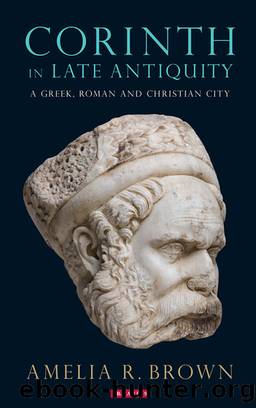Corinth in Late Antiquity: A Greek, Roman and Christian City by Amelia R. Brown

Author:Amelia R. Brown [Brown, Amelia R.]
Language: eng
Format: epub
Tags: History, Middle East, General, Political Science, World, Middle Eastern, Religion, Islam, Social Science, Islamic studies, Leadership, Sociology of Religion, Philosophy, Religious, Ancient
ISBN: 9781786723581
Google: Z9WLDwAAQBAJ
Publisher: Bloomsbury
Published: 2018-02-22T20:42:22+00:00
NOTES
IntroductionâSignificance, Scholarship and Structure
1.Corinth Museum inv. nos. S-920 (priest's head), S-909 (bearded head) and S-919 (cross-marked head). For further images and excavation data on these and other finds listed below from the ASCSA Corinth Excavations, see the website ascsa.net and enter the inventory number (inv. no. or Corinth Excavations Notebook (NB) number). For public sculpture and its disposal in Corinth in Late Antiquity see Chapter 5, Amelia R. Brown 2012a, 2016a, 2016b; Betsey Ann Robinson 2011, 281â92.
2.Late Antiquity here corresponds with an era of ancient history variously called Late Roman, Early Christian, Early Byzantine or early medieval, extending in political terms from the end of the Severan Dynasty of Roman emperors in 235 to the murder of the usurper emperor Phocas in 610. The subsequent emperor Heraclius founded a new dynasty and lost political control over much of his Eastern Roman (Early Byzantine) Empire to invading Avars, Slavs and Muslim Arabs. These political markers, along with changes in material culture, signal a shift to Late Antiquity from the Roman Empire of the early third century, and then to the Middle Byzantine or medieval era of the early seventh century. Late antique Corinth was always officially a city of the Roman Empire, ruled from Rome, and then from Constantinople, by Roman emperors. This was still the case until the Crusader (or at Corinth the Frankish) era of the thirteenth century, and then the Venetian and Ottoman conquests which preceded the foundation of the modern Greek state in the nineteenth century. The history of Corinth in Late Antiquity starts in the later second and early third century, with the high Roman Empire, with Corinth near the geographic center of the Empire, and contributes our greatest concentration of literary and monumental evidence. Since much of the ancient (especially archaeological) evidence can be dated only within a century, the scope of this study is from that era to roughly the later sixth and early seventh century, before the Avar and Slav invasions and Arab raids.
3.Pausanias 10.5.3. Only in the middle of the nineteenth century was Corinth's civic center transferred northwards down to the shore of the Corinthian gulf, between the ancient western harbors of Lechaion and Poseidonia. When many Corinthians moved there, new settlers from the hills in the southern Corinthia resettled the village of Ancient Corinth, atop the ruins of the ancient, late antique, Byzantine, Frankish, Venetian and Ottoman civic center, and welcomed the archaeologists.
4.John Chrysostom, Homily on the First Epistle to the Corinthians Argument 1â2 (PG 61, 9), ed. Schaff 1898 (NPNF 12).
5.For Byzantine Corinth, and the Peloponnese, see Avraméa 1997; Anagnostakis and Kaldellis 2014.
6.Cameron 1991; Brown 1992; Horden and Purcell 2000.
7.Gibbon 1788 (1994); Jones 1964; Brown 1971; Heather 2005; Ward-Perkins 2005.
8.Avraméa 1997, 72â9; Sanders 2003b.
9.Morgan 1942 (Corinth XI); Hayes 1972; Slane and Sanders 2005.
10.Alcock 1989, 1994.
11.Scranton 1957 (Corinth XVI).
12.Carpenter 1928; Finley 1932; Fowler and Stillwell 1932 (Corinth I); Davidson 1937; Davidson 1940; Weinberg and Weinberg 1946; Charanis 1952; Davidson Weinberg 1974, 1975. See further details in Appendix II.
13.Slane 1987, 1990 (Corinth XVIII.
Download
This site does not store any files on its server. We only index and link to content provided by other sites. Please contact the content providers to delete copyright contents if any and email us, we'll remove relevant links or contents immediately.
Room 212 by Kate Stewart(5107)
The Crown by Robert Lacey(4810)
Endurance: Shackleton's Incredible Voyage by Alfred Lansing(4773)
The Iron Duke by The Iron Duke(4351)
The Rape of Nanking by Iris Chang(4208)
Joan of Arc by Mary Gordon(4104)
Killing England by Bill O'Reilly(3998)
Say Nothing by Patrick Radden Keefe(3976)
I'll Give You the Sun by Jandy Nelson(3431)
Shadow of Night by Deborah Harkness(3361)
Hitler's Monsters by Eric Kurlander(3331)
Mary, Queen of Scots, and the Murder of Lord Darnley by Alison Weir(3208)
Blood and Sand by Alex Von Tunzelmann(3199)
Eleanor & Park by Rainbow Rowell(3156)
Darkest Hour by Anthony McCarten(3121)
Margaret Thatcher: The Autobiography by Thatcher Margaret(3081)
Book of Life by Deborah Harkness(2935)
Red Famine: Stalin's War on Ukraine by Anne Applebaum(2930)
The One Memory of Flora Banks by Emily Barr(2857)
